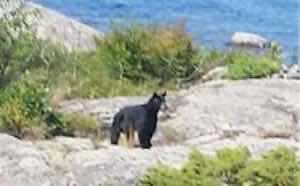George Soros donated $650,000 to the Catholic Church
The Vatican Accepting Bribes?
No--couldn't be. After all, Pope Francis has been busy cleaning up the establishment ever since he was chosen as the Catholics' leader pro tem. Andreas Englisch's 2015 book "
The Fighter in the Vatican" is full of examples.
The report that one
George Soros donated $650,000 to the Catholic Church to convey the need for some reticent bishops' support for his climate-money-making-system appears to indicate otherwise. The transfer was soon followed by some "falling in line." Strictly one of many coincidences, perhaps, all following the mysterious:
Law of Coincidences
Indeed, the world is full of mysterious coincidences--mainly because some vital information is missing from the reports. Really, many of these mysteries are becoming obvious only years or even decades later, when the missing links surface; some never do.
In the (purely hypothetical) case of me trying to hand-feed our local Black bear (see photo nearby, depicting a recent encounter by the author, ca 15 m from an elevated point of view; bear estimated to be 2-1/2 years old, likely male, weighing around 200 lbs.) with some scraps from our dinner table and (hypothetical again) friend Bruno finding some of MY body parts more nourishing than the gnawed off chicken bones, I can envision two kinds of media reports:

- "Man Mauled by Vicious Bear," and
- "Don't feed Bears."
As you can easily see, already the (hypothetical) titles produce entirely different perceptions. Depending on the details provided in the first text (if given), it may conjure a picture of "being at the wrong place at wrong time" while the second title already hints at what I call the:
Law of Consequences
As you may surmise, my view of "coincidences" is a bit askew. Yes, there are some genuine coincidences in life but, IMHO, there are far too many. The law of consequences is more likely to affect you, one way or the other.
If you want to feed a hungry bear with a babe in your arms (I have personally observed that in the Yellowstone Natl. Park), it could lead to unforeseen consequences.
If you vote for more "free manna from heaven," it could enslave you and yours for generations to come. The "free lunch" you are promised is an utopian dream; you can pay now for the full cost--or palm it off onto your descendants.
Our bear may be hungry--let him find some nourishment in the woods. What's critical for him is the current state of health (he does not appear to suffer) and the amount of nutrition he needs to survive for hibernating the coming long cold winter period. His life is not all that different from that of us who live with large seasonal variations in temperature and precipitation.
Seasons Come and Go
Unless you live close to the equator (for example Hawaii) where the daily weather rhythm rarely changes, in the latitudes closer to the earth's poles summer and winter seasons come with substantial changes. In the summer it can be hot and dry, for weeks, and the winters can bring piles of snow, icy roads and sidewalks, also lasting for weeks. Already at the mid-latitude of 45 deg. (N or S), the seasonal temperature range is typically around 125 or more degrees F.
Those climatic variations put a lot of strain on everything, not just the people living there. As soon as you get into areas where frost can affect buildings, roads, or just a water pipe, you want to guard against the effects of freezing water with its 10% expansion, relative to the liquid. In short, as much as possible, every structure needs to have a foundation below the frost line (typical depth of freezing in winter), any water system used only in summer needs to be fully drained or winterized with antifreeze, and so on.
If you get to experience that type of climate first time, you'll be amazed what all can freeze into a rock hard solid over night--even indoors. If you have access to a fridge at the time, it is useful to keep things WARM (relative to the surroundings). Your toothpaste, eggs, and anything else that may have been fluid and soft in summer may have now turned into a granite-like material. Better keep a 10-lb sledge hammer handy to break up your eggs, etc. But the real fun starts in spring when it's pothole season.
Pothole Season
That's when the surface soil warms on the top but below it's still frozen. Road beds and foundations of structures (if not below the frost line) have been pushed up by the expanding ice and tend to settle back, mostly in an uneven way. To prevent road damage then, trucks are widely limited to reduced axle weight. But that kind of foresight only limits part of the damage. That damage is commonly known as potholes. And they can appear for no good reason just about anywhere. Some people say that there are only two seasons in this neck of the woods, i.e. winter and construction seasons; I think they forget about pothole season.
Apart from potholes on the roads, there are also those that people in the media find themselves in, mostly because of their own fault. The "virtual" pothole season can be just as damaging as those in the ground. That season appears to last much longer and the holes can take even longer to "fix" than the others as well.
When church leaders start teaching physics and physicists start teaching religion, both groups are bound to step into giant potholes. They'd better ask the benevolent George Soros for another donation soon -- before he too suffers the same fate.
DEAR GEORGE,
PLEASE HELP!
SEND MONEY
Dr. Klaus L.E. Kaiser -- Bio and
Archives |
Comments
Dr. Klaus L.E. Kaiser is author of CONVENIENT MYTHS, the green revolution – perceptions, politics, and facts Convenient Myths

